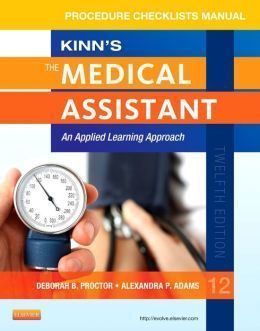Kinn's The Medical Assistant An Applied Learning Approach

Genre
- Handbooks, Manuals, Etc.
- Workbook
Subject
- Medical Assistants - Examinations, Questions, Etc,
Plot
This new resource is a compilation of the clinical material covered in the comprehensive book Kinn's The Medical Assistant: An Applied Learning Approach, 9th Edition, complimenting its administrative counterpart Kinn's The Administrative Medical Assistant, 5th Edition. Building on Kinn's unique approach of teaching skills within the medical specialty context, this volume introduces an "applied learning" approach that focuses on the real-world context required to apply theory and skills from the text to various case studies throughout the chapters. All chapters begin with a scenario appropriate to the content, and contextual exercises are incorporated throughout the chapter. Critical Thinking Applications featured with a specific icon appear periodically throughout a chapter and relate to the chapter-opening scenario, challenging students to use specific concepts to make decisions about a "real-life" situation. Websites relating to the chapter help MA students find more information online and stay current with business news and medical industry developments. "Student Skills" chapters (Chapters 1 and 33) equip students with skills for succeeding in the MA program and for finding a job. New ECG chapter integrates content formerly in the cardiology chapter enables the student to focus on skills related solely to ECG, making the information easier to grasp. New endocrinology chapter presents all-new material on conditions that affect patients with endocrine disorders. Revised organization more closely aligns the book's progression with the AAMA and RMA curricula, grouping topics together more logically. Transdisciplinary themes are introduced in an applied context - legal/ethical, communication, professionalism, patient education, and office management - woven throughout the chapters, in scenarios, and in critical thinking applications. Applied-learning approach features a scenario at the beginning of each chapter suited to that chapter's focus, which is summarized at the chapter's end - centering on a fictional MA who needs to make decisions and address critical issues - to help students develop sound critical thinking and decision-making skills. Administrative concepts - medical codes, telephone triage, protocols, documentation, etc. - that apply to various diseases and conditions are integrated into their applied clinical context. Increased emphasis on medical terminology features a vocabulary spelling and terminology review in the Student Study Guide and bolded words within the chapter to reinforce medical terminology in context. More emphasis on pathophysiology and a better review of anatomy and physiology meets curriculum requirements in pathophysiology and provide more "real-world" application of common diseases and conditions, while the revised A&P review provides a better framework for understanding pathological system conditions. Expanded sections on medical terminology, A&P, and pathophysiology, plus more emphasis on pharmacology, make the book more comprehensive and inclusive. Figures have been revised, replaced, and augmented to accurately reflect the current medical office environment and provide clearer graphics, more images of equipment, more disease examples, and better illustration of key procedural steps. Many new chapter features, including an all-new interior design, tighter focus, new color palette, and fresh icons enliven this edition and make information easy to follow.


 English
English  Nederlands
Nederlands  Deutsch
Deutsch  Français
Français  Español
Español  Magyar
Magyar  српски
српски  Dansk
Dansk  Italiano
Italiano  Svenska
Svenska  Slovenčina
Slovenčina  Português
Português 
